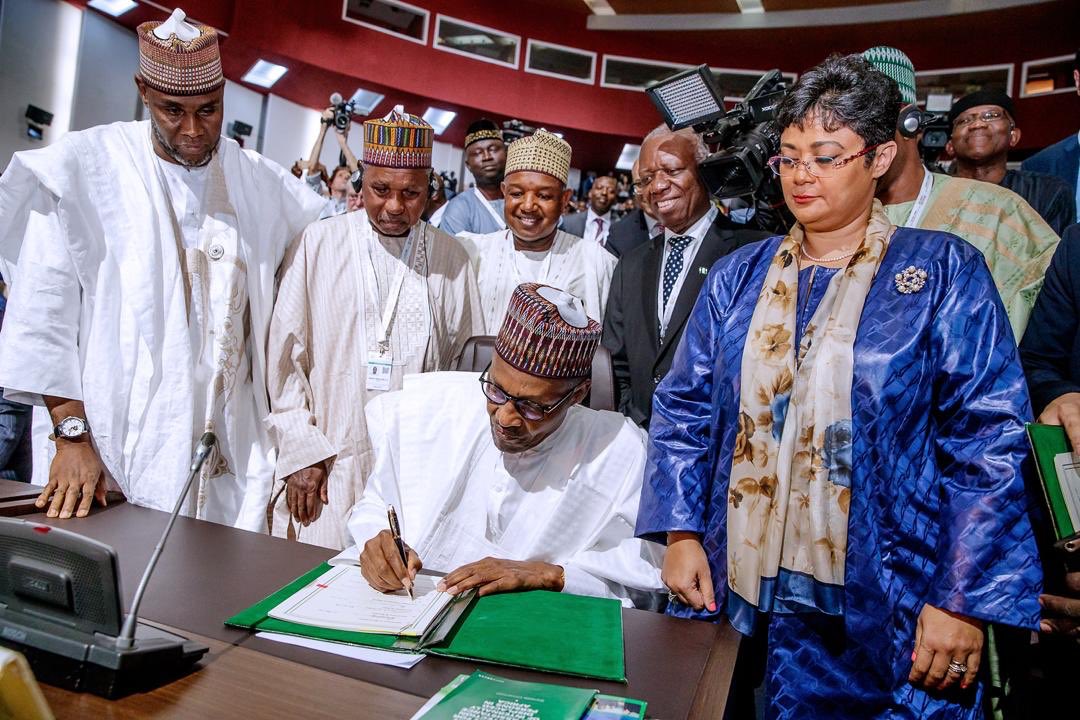BY AYO ARIBIDARA and ADE ADEFEKO
The African Continental Free Trade Agreement (AfCFTA) presents an array of opportunities for Africa to reap economic and social benefits on the back of possible future improvements in areas such as – infrastructure, reduction of tariff and non-tariff barriers to cross-border trading, renewed funding and improved liquidity. Since Nigeria signed the AfCFTA, there has been a lot of enthusiasm about its effects on the Nigerian economy.
The agreement aims to bring together the 54 African countries with a combined population of 1.2 billion people and a GDP of over USD 3 trillion by creating a continental market for goods and services with the progressive liberalization of tariff lines, free movement of people and capital. Noting all of these derivable gains, the AfCFTA will be vital to Africa and Nigeria’s recovery from the COVID-19 pandemic in stimulating growth, creating employment and diversifying the economy.
Along with signing the agreement, resources have been expended on further negotiations for the other protocols attached to the Agreement and the establishment of a Presidential National Action Committee on AfCFTA (NAC-AfCFTA) in December 2019 to guide Ministries, Departments and Agencies (MDAs) and the organized private sector on the AfCFTA implementation. As one of the outcomes from the ongoing negotiations, the Nigerian Office for Trade Negotiations (NOTN) had earlier in the year unveiled the requirements for Nigerian traders to trade under the AfCFTA on a list of Eighty-Nine (89) items that had qualified for preferential tariffs.
Advertisement
Some of the products identified as eligible for preferential treatment under the Protocol on Trade in Goods include live animals, dairy produce, cocoa and cocoa preparations, sugars, and sugar confectionery, beverages, spirits and vinegar, tobacco, wood, and articles of wood, photographic and cinematographic goods, pulp of wood, paper and paperboard, footwear, basic metals, arms and ammunition among others. To benefit from the preferential tariff, a Nigerian exporter would be required to get the AfCFTA Certificate of Origin which is the proof of origin issued to confirm that the particular product complies with the origin criteria applying to preferential trade under the AfCFTA the Annex Protocol on Trade in Goods.
The AfCFTA was conceived to be the vehicle through which Intra-African trade can be stimulated. This is because statistics show that Intra-African trade has been low on the continent and in 2020, only 19% of Nigeria’s world exports and 8% of world imports were intra-African. Between 2019 and 2020, Nigeria’s exports to Africa declined by 42%, and imports declined by 43%. The value of the 2020 Nigerian intra- African export stood at USD 6.4 billion and the main exports were crude petroleum oil, vessels and aircraft. An Oxford Economics research conducted in conjunction with Baker McKenzie which looked at African imports from outside the continent revealed that over 50% of Africa’s combined need is comprised of manufactured products, industrial machinery and transport equipment.
Presently, Africa’s most important external suppliers of manufactured goods are Europe (35%), China (16%) and the rest of Asia including India (14%). By contrast, imports from other parts of Africa account for only 16% of total merchandise imports. Manufacturing GDP represents averagely only 10% of GDP in Africa. Undoubtedly intra-African trade under the AfCFTA holds a lot of potentials and Nigeria needs to channel its effort to fill the gap in the manufactured products, industrial machinery, transport equipment sectors as well as consolidate other sectors such as financial services and technology where it holds a comparative advantage.
Advertisement
However, trade is not an end in itself and to achieve profitable trading, trade enhancing measures must be improved. Some of the required trade enhancing measures include; the monetary policy by the Central Bank of Nigeria (CBN), the fiscal policy of the Ministry of Finance, Trade facilitation measures being implemented from the Nigerian Customs Service and the National Trade Policy from the Ministry of Industry, Trade and Investment. Aside from the delays being experienced in enacting the AfCFTA as a domestic Nigerian law, which has made it impossible for Nigerian businesses to benefit from the tariff preferences, there are other challenges with the inefficient monetary and fiscal policy implementation in Nigeria which affect the economy as a whole.
There is still no substantive National Trade Policy document in Nigeria and trade facilitation measures have not yielded desired results because the Nigerian Customs Service is majorly focused on revenue generation rather than ensuring more deep-rooted behind-the-border gains. Getting these trade enhancing measures right is critical to ensuring success with the AfCFTA implementation. Despite the NAC-AfCFTA efforts, recent data from the Centre for the Study of the Economies of Africa (CSEA) shows that over 60 per cent of Nigeria’s businesses are still unaware of the recently signed AfCFTA. This is coupled with a myriad of archaic or non-existent legal frameworks on such areas as weights and measures, co-operatives and international trade administration (Trade Remedies, Tariff Investigations, Import Control and Export Control). South Africa has a similar agency called The International Trade Administration Commission of South Africa (ITAC).
In comparison to Nigeria, South Africa is already benefiting from the AfCFTA by harnessing its potentials for further trade expansion; this is due to its existing trade linkages across the continent and a well-established manufacturing base. Likewise, the AfCFTA has also yielded some benefits for Ghana and Côte d’Ivoire, and these are attributable to the existing favorable conditions of having open economies, good infrastructure and enabling business environments. As noted above, trade is not an end in itself, as such there must be coherence among the implementing government Agencies and this must align with the ambitions of the Organised Private sector in Nigeria. It is noteworthy that trade enhancement measures have been introduced by the CBN in some areas like agriculture, manufacturing, pharmaceuticals and MSMEs development, but in some cases, these interventions have usurped the responsibilities of the Ministry of Finance (fiscal policy) and their Trade counterpart (Trade development) with little or no scope for cooperation from the other Ministry or Agency.
A whole lot has been said about Nigeria reclaiming its lost economic glory, and the AfCFTA presents a unique opportunity for this however, it will only happen with cautious implementation, focus on sectorial improvements, building on the successes achieved and a departure from ad-hoc measures to a sustained and holistic longer-term approach in critical sectors; agriculture (seed research, farming techniques and production, agro value chain), manufacturing, services and ICT. The bottom line is the attainment of some level of self-sufficiency in these critical sectors as we depart from an oil-dependent culture.
Advertisement
Nigeria’s departure from oil dependency should not also lead to commodities export dependence without value addition through technology and innovation. Over three-quarter of Africa’s exports to the rest of the world is heavily focused on natural resources, primarily raw materials and a buck of these are with third countries outside Africa. The trio of Egypt, Nigeria and South Africa represent more than half of the continent’s GDP, they are also major fuel exporters but with a focus on exports outside the continent. Particularly, Nigeria and Egypt have had very limited trade relationships with neighboring African countries. On the continent Uganda and Zimbabwe have the highest shares of intra-African trade component of their respective overall trade figures, trading more with their neighbors than other African nations do.
To ensure success with the AfCFTA, the private sector in Nigeria should be engaged further in a more strategic and coordinated manner. Protectionism should give way for coordinated trade liberalization not only on Trade in goods but also on Trade in services. Trade in services is especially promising, considering that the services sector currently accounts for over half of gross value addition around Africa and this growth represents a path to overcoming the existing production and industrialization limitations that threaten Africa-wide trade in goods. Parameters should be put in place to formalize the informal sector operators, border export zone should be introduced just like it is done in the East African Community (EAC) as this can be used to check the scourge of smuggling, which will also encourage the formalization of the informal Cross-Border Traders (ICBT). This would involve the adoption of policies aimed at addressing the extensive barriers faced by informal cross-border traders.
Going forward, the passing of the Agreement establishing the AfCFTA by the National Assembly through a bill which The President of the Federal Republic of Nigeria will assent should be a top priority, and considerations should be given to deploying omnibus laws as a cost-effective vehicle to ameliorate the current legal gaps in such areas as international trade administration (to handle issues of Trade Remedies which will check the trend and threat of dumping, Tariff Investigations, Import Control and Export Control) and weights and measures (to harmonize the various weights and measurement standards in the country). Nigeria must get it right with the AfCFTA for two reasons, the first being to provide a larger market opportunity for goods and services to producers and consumers alike, while the second is to maintain the leading role that Nigeria plays on the continent. The delay with the AfCFTA implementation is already robbing Nigerian trade experts of opportunities, currently, the AfCFTA secretariat in Accra is almost entirely made of Southern and Eastern African staff with a handful of Ghanaian junior staff. The importance of cooperative societies as a tool to economic development must be harnessed as this can also help for equitable inclusion of women in the value chain. The previous work done by the Presidential Enabling Business Environment Council (PEBEC), the Presidential National Action Committee on AfCFTA (NAC-AfCFTA) and the private sector-led initiatives such as The National Assembly Business Environment Roundtable (NASSBER) should be built upon to avoid repetitive effort and ensure quick gains in this regard.
Lastly, Nigeria is in dire need of a National Trade Policy document and as a matter of urgency the Ministry of Industry, Trade and Investment need to convene a dialogue that would involve all stakeholders to develop a policy document that is reflective of Nigeria’s trade commitment and ambition. Also, steps should be taken to domesticate the measures in the Trade Facilitation Agreement (TFA) which Nigeria has ratified. This is necessary to transform the revenue generation narrative of the Nigerian Customs Service with a concerted focus on trade facilitation measures.
Advertisement
Aribidara is a trade governance and development specialist.
Adefeko is chairman of NACCIMA Export Trade Group.
Advertisement
Views expressed by contributors are strictly personal and not of TheCable.






